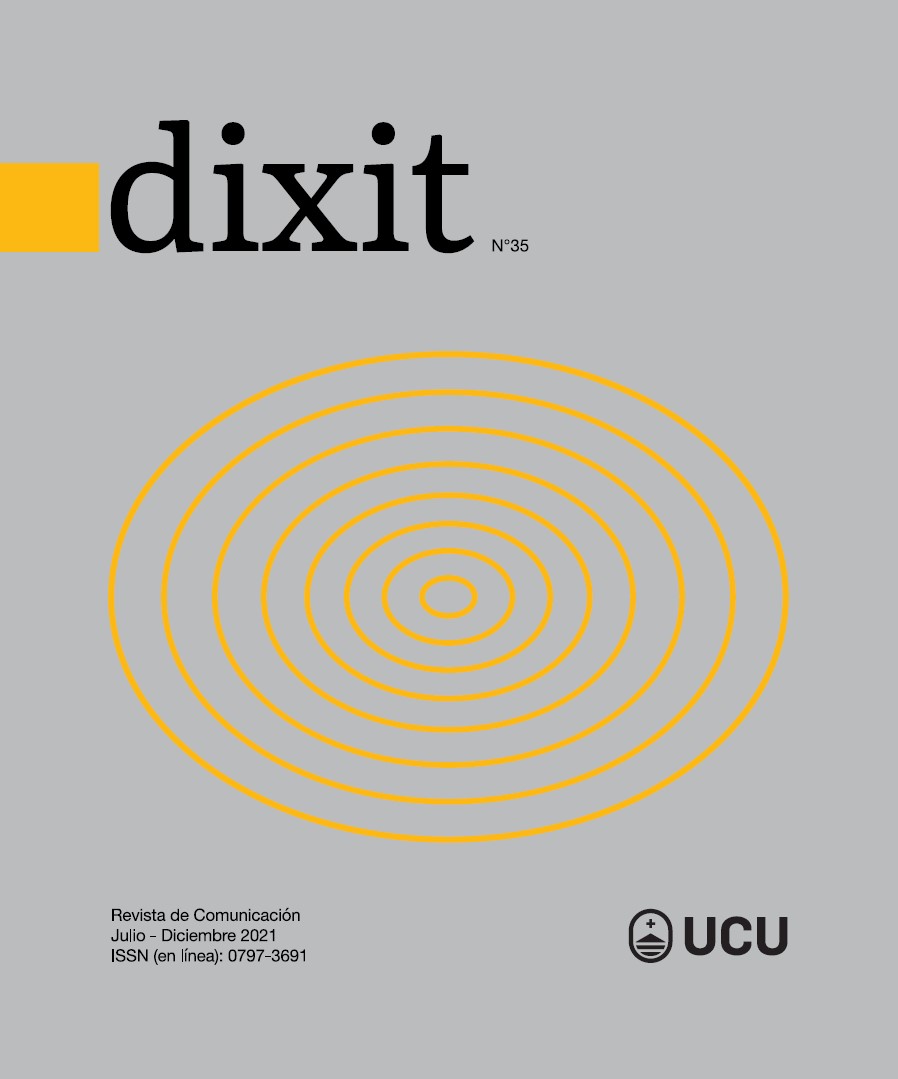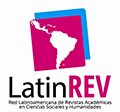Digital Interactions in a Transnational Context: Communicative Practices of International Students in Barcelona
DOI:
https://doi.org/10.22235/d35.2471Keywords:
digital technologies, mediated interactions, international students, digital migrationAbstract
This paper aims to describe how the digital socialization experience, understood as interaction through social media, of international college students in Barcelona, Spain is composed during their mobility periods. Based on a literature review that addresses concepts such as polymedia or co-presence and through an ethnographic approach, the study describes, in terms of their distribution and disposition or their impact on the nostalgia that young people may suffer, the digital interac-tions that international students maintain both with their home environments and with those they have met at the host site. The conclusions suggests that digital interactions contribute to reducing the impact of the physical and emotional separation that students experience when temporarily living in another country.
Downloads
References
Baldassar, L. (2016). De‐demonizing distance in mobile family lives: co‐presence, care circulation and polymedia as vibrant matter. Global Networks, 16(2), 145-163. https://doi.org/10.1111/glob.12109
Bacigalupe, G., y Bräuninger, I. (2017). Emerging technologies and family communication: The case of international students. Contemporary Family Therapy, 39(4), 289-300. https://doi.org/10.1007/s10591-017-9437-7.
Beneito-Montagut, R. (2011). Ethnography goes online: towards a user-centred methodology to research interpersonal communication on the internet. Qualitative Research, 11(6), 716–735. https://doi.org/10.1177/1468794111413368.
Bermúdez, R. (2015). La movilidad internacional por razones de estudio: Geografía de un fenómeno global. Migraciones Internacionales, 8(1), 95-125.
Burchell, K. (2017). Everyday communication management and perceptions of use: How media users limit and shape their social world. Convergence: The International Journal of Research into New Media Technologies, 23(4), 409-424. https://doi.org/10.1177/1354856517700382
Cairns, D. (ed.). (2010). Youth on the Move. European Youth and Geographical Mobility. VS Verlag für Sozialwissenschaften.
Cefai, S., y Couldry, N. (2017). Mediating the presence of others: Reconceptualising co-presence as mediated intimacy. European Journal of Cultural Studies, 22(3), 291-308. https://doi.org/10.1177/1367549417743040
Dekker, R., y Engbersen, G. (2014). How social media transform migrant networks and facilitate migration. Global Networks, 14(4), 401-418. https://doi.org/10.1111/glob.12040
Feixa, C. (2014). De la Generación@ a la #Generación: La juventud en la era digital. Nuevos Emprendimientos Editoriales.
Fernández, S., y Ruzo, E. (2004). Los procesos de internacionalización y globalización en la educación superior: un análisis de los países de la OCDE. Revista de Educación, 335. 385-413.
Hammersley, M., y Atkinson, P. (1983). Ethnography: Principles in practice. Tavistock.
Hinton, S., y Hjorth, L. (2013). Understanding Social Media. SAGE.
Hjorth, L. (2005). Locating Mobility: Practices of co-presence and the persistence of the postal metaphor in SMS/MMS mobile phone customization in Melbourne. Fibreculture Journal, 6. http://six.fibreculturejournal.org/fcj-035-locating-mobility-practices-of-co-presence-and-the-persistence-of-the-postal-metaphor-in-sms-mms-mobile-phone-customization-in-melbourne/
Hofer, B., Thebodo, S., Meredith, K., Kaslow, Z., y Saunders, A. (2016). The long arm of the digital Tether: Communication with home during study abroad. Frontiers: The Interdisciplinary Journal of Study Abroad, 28, 24-41.
Hua, P. (2018). Understanding the effects of WeChat on perceived social capital and psychological well-being among Chinese international college students in Germany. Aslib Journal of Information Management, 70(3), 288-304. doi: 10.1108/AJIM-01-2018-0003
Kang, T. (2012). Gendered media, changing intimacy: Internet-mediated transnational communication in the family sphere. Media, Culture & Society, 34(2), 146-161. https://doi.org/10.1177/0163443711430755
King, R. (2002). Towards a new map of European migration. International Journal of Population Geography, 8(2), 89-106. https://doi.org/10.1002/ijpg.246
Lambert, A. (2016). Intimacy and social capital on Facebook: Beyond the psychological perspective. New Media & Society, 18(11), 2559-2575. https://doi.org/10.1177/1461444815588902
Li, L., y Peng, W. (2019). Transitioning through social media: International students’ SNS use, perceived social support, and acculturative stress. Computers in Human Behavior, 98(1), 69-79. https://doi.org/10.1016/j.chb.2019.03.011
Licoppe, C. (2004). ‘Connected’ presence: The emergence of a new repertoire for managing social relationships in a changing communication technoscape. Environment and Planning D: Society and Space, 22(1), 135-156. https://doi.org/10.1068/d323t
Madianou, M. (2016). Ambient co‐presence: transnational family practices in polymedia environments. Global Networks, 16(2), 183-201. https://doi.org/10.1111/glob.12105
Madianou, M., y Miller, D. (2012b). Polymedia: Towards a new theory of digital media in interpersonal communication. International Journal of Cultural Studies, 16(2), 169–187. https://doi.org/10.1177/1367877912452486
Martin, F., y Rizvi, F. (2014). Making Melbourne: Digital connectivity and international students’ experience of locality. Media, Culture & Society, 36(7), 1016-1031. https://doi.org/10.1177/0163443714541223
Meyrowitz, J. (1985). No Sense of Place: The Impact of Electronic Media on Social Behavior. Oxford University Press.
Miller, D., Costa, E., Haynes, N., McDonald, T., Nicolescu, R., Sinanan, J., Spyer, J., Venkatraman, S., y Wang, X. (2016). How the World Changed Social Media. UCL Press.
Ng, N., Haslam, S., Haslam, C., y Cruwys, T. (2018). “How can you make friends if you don't know who you are?” A qualitative examination of international students' experience informed by the Social Identity Model of Identity Change. Journal of Community & Applied Social Psychology, 28(3), 169-187. https://doi.org/10.1002/casp.2349
Organización de las Naciones Unidas. (s.f.). Juventud. Recuperado de: https://www.un.org/es/sections/issues-depth/youth-0/index.html
Peng, Y. (2016). Student migration and polymedia: Mainland Chinese students’ communication media use in Hong Kong. Journal of Ethnic and Migration Studies, 42(14), 2385-2403. https://doi.org/10.1080/1369183X.2016.1194743
Pink, S., y Morgan, J. (2013). Short-Term ethnography: Intense routes to knowing. Symbolic Interaction, 36(3), 351–361. https://doi.org/10.1002/SYMB.66
Rodríguez, C., Herrera, L., Quiles, O., y Álvarez, J. (2008). El valor familia en estudiantes universitarios de España: análisis y clasificación. Enseñanza e Investigación en Psicología, 13(2), 215-230.
Schrooten, M. (2012). Moving ethnography online: researching Brazilian migrants' online togetherness. Ethnic and Racial Studies, 35(10), 1794-1809. https://doi.org/10.1080/01419870.2012.659271
Scolari, C. (ed.). (2018). Adolescentes, medios de comunicación y culturas colaborativas. Aprovechando las competencias transmedia de los jóvenes en el aula. Transliteracy H2020 Research and Innovation Actions.
Shane-Simpson, C., Manago, A., Gaggi, N., y Gillespie-Lynch, K. (2018). Why do college students prefer Facebook, Twitter, or Instagram? Site affordances, tensions between privacy and self-expression, and implications for social capital. Computers in Human Behavior, 86, 276-288. doi: 10.1016/j.chb.2018.04.041
Vertovec, S. (2007). Super-diversity and its Implications. Ethnic and Racial Studies, 30(6), 1024–54. https://doi.org/10.1080/01419870701599465
Yang, C. (2016). Social media as more than a peer space: College freshmen encountering parents on Facebook. Journal of Adolescent Research, 33(4), 1-28. https://doi.org/10.1177/0743558416659750
Yu, Q., Foroudi, P., y Gupta, S. (2019). Far apart yet close by: Social media and acculturation among international students in the UK. Technological Forecasting and Social Change, 145, 493-502. https://doi.org/10.1016/j.techfore.2018.09.026
Downloads
Published
How to Cite
Issue
Section
License
Copyright (c) 2021 Dixit

This work is licensed under a Creative Commons Attribution 4.0 International License.
From issue number 32 onwards all contents are licensed under the Creative Commons Attribution 4.0 International License (CC BY 4.0).
Issues number 29-31 are licensed under the Creative Commons Attribution-NonCommercial 4.0 International License.
The contents corresponding to number 28 and earlier editions are under the Creative Commons Attribution-NonCommercial-ShareAlike 4.0 International License.


















